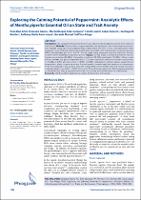Exploring the calming potential of peppermint: anxiolytic effects of mentha piperita essential oil on state and trait anxiety

View/
Author(s)
Alvarado-García, Paul Alan Arkin
Soto-Vásquez, Marilú Roxana
Cubas Romero, Taniht Lisseth
Benites, Santiago M.
Auris-López, Anthony Derlis
Del Pino-Aliaga, Gerardo Manuel
Date
2024Metadata
Show full item recordPublisher
Pharmacognosy
Journal
Pharmacognosy Journal
Abstract
This study aimed to evaluate the anxiolytic effect of Mentha piperita essential oil on state and trait anxiety. Methods: The essential oil was extracted by hydrodistillation, and its chemical composition was analyzed using Gas Chromatography-Mass Spectrometry (GC-MS). A total of 93 participants were divided into a control group (CG) and an experimental group (EG), with 47 participants in the EG receiving MPEO aromatherapy and 46 in the CG. Anxiety levels were measured using the State-Trait Anxiety Inventory (STAI) at pretest and posttest phases. Results: GC-MS analysis showed that menthol had the highest concentration (42.56%), followed by menthone (19.24%) and linalool (11.68%). Mixed model analysis revealed that group assignment (EG vs. CG) was a significant predictor of posttest state anxiety (F=16.508, p=0.001) and trait anxiety (F=9.091, p=0.003), independent of pretest scores, supporting the intervention’s effect on reducing anxiety. Posttest results showed a significant reduction in state anxiety in the EG compared to the CG (p=0.001) with a large effect size (r=0.508), while trait anxiety showed a moderate reduction (p=0.001, r=0.342). Conclusion: These findings suggest that Mentha piperita essential oil may effectively reduce state and trait anxiety, with a more pronounced impact on state anxiety.
Type
info:eu-repo/semantics/article
Rights
info:eu-repo/semantics/openAccess
Language
eng
Collections
- Psicología [75]

